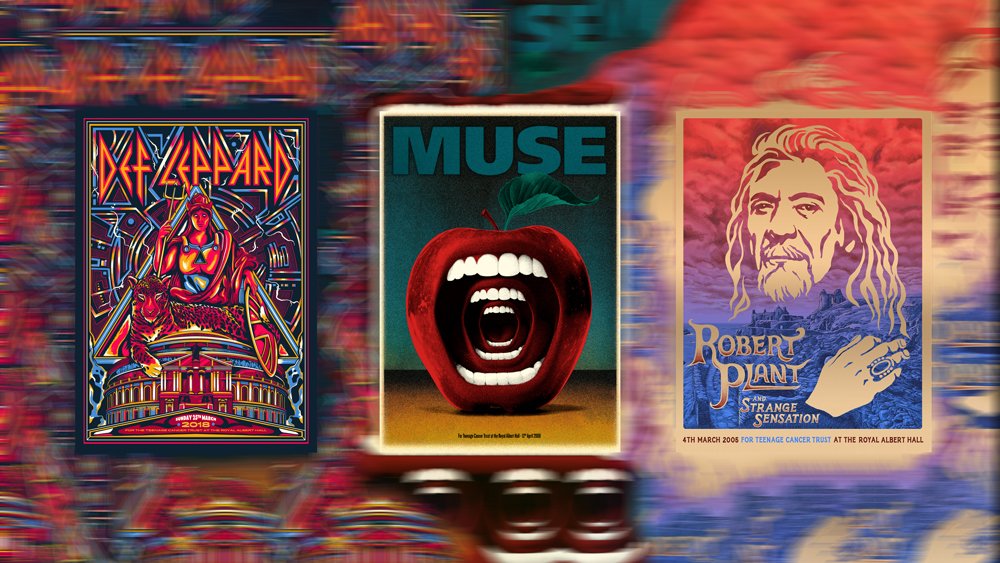The full list of bands and artists who have created the new prints areas follows:
· Biffy Clyro by Dan Mumford
· The Chemical Brothers by Kate Gibb
· Courteeners by Pete McKee
· Def Leppard by Matt G
· Depeche Mode by Chris Skinner
· Doves by Pete McKee
· Eddie Vedder by Josh Townshend
· Ed Sheeran by Pete McKee
· Frank Turner by Miles Tewson
· Kaiser Chiefs by The Red Dress
· Kasabian by James Taylor
· Madness by Pete McKee
· Muse by Tommy Davidson
· New Order by Warren Jackson
· Nile Rodgers and CHIC by Pete McKee
· Noel Gallagher by Pete McKee
· Noel Gallagher/Damon Albarn/Graham Coxon by 45Original
· Ovation 2024 by Steve Mitchell
· Paul Weller by Max Loeffler
· Robert Plant by Mishka Westell
· Roger Daltrey Gala 2023by 45 Original
· Squeeze by Ben Beach
· Stereophonics by Jon Fox
· Supergrass by Luke McLean
· The Cure 2006 by Vella Design
· The Cure 2014 by Vella Design
· Tom Grennan by Jose Saccone
· Underworld by Simon Taylor
· Wet Leg by Pete McKee
· The Who & Friends by Joel Burden
· The Who by Josh Townshend
· Young Fathers by Hingston Studio
About Teenage Cancer Trust
Since 1990, Teenage Cancer Trust’s nurses, youth support coordinators and specialist hospital units have been at the forefront of providing life-changing care for young people with cancer.
Teenage Cancer Trust has pioneered the development of treatment and support specifically for teenagers and young people with cancer, which didn’t exist in the UK before the charity formed in 1990.
Teenage Cancer Trust has 28 purpose-built units within NHS hospitals which are places where young people aged 13- 24 can feel at home, meet others their age, and welcome family and friends, while being looked after by a dedicated team of specialists.
We also run events for young people with cancer follow their treatment. We bring young people with cancer together to share experiences, develop life skills, build connections – and most importantly have some fun. We give the mall the information and support they need at a critical point in their recovery, on topics like fertility, nutrition, exercise, employment and more.
Why this is a critical time for young people with cancer?
· More young people are getting cancer. Every day, seven young people aged 13-24 hear the words “you have cancer”. By 2030 that number will be closer to 10.
· Cancer hits young people hard. More teenagers and young adults in the UK die from cancer than any other disease. And for those who survive, going through it without the right support can cause lifelong physical and emotional damage.
· With healthcare services stretched, waiting times for cancer diagnosis and treatment are at an all-time high. These delays can compound the impact of cancer on young people’s physical and mental health. Getting the right support now is crucial to prevent a crisis for future generations.
· Life is already tough for young people. A cancer diagnosis can compound this. Research by The Prince’s Trust reveals almost half (46%) of young people in the UK report economic uncertainty makes them feel hopeless about the future and that their mental health is at an all-time low.
Why is cancer different when you’re young?
Facing cancer is incredibly hard at any age. But there are lots ofreasons cancer can hit young people even harder.
· Getting a cancer diagnosis in the first place is harder. Although cancer in teenagers and young adults is more common than you might think, it is still relatively rare, and symptoms can often be mistaken for growing pains or infections. In a 2022 survey, nearly half (47%) of teenagers and young adults diagnosed with cancer had to see their GP three or more times before referral – the most out of any age group
· Cancer treatments can be less effective for young people. The physical changes and rapid growth we go through during puberty and young adulthood can negatively affect how the body metabolises chemotherapy drugs, for example, or can lead to more severe side-effects with a higher risk of short and long-term complications
· Accessing clinical trials can be harder. Clinical trials help researchers find new and better treatments. But many trials are designed for children or older adults, meaning teenagers and young adults might not be eligible to join or won’t get treatment tailored to their age group. And because there are lots of different types of cancer that can affect young people, patient numbers for each cancer type are small, which makes it harder to recruit and run trials.





